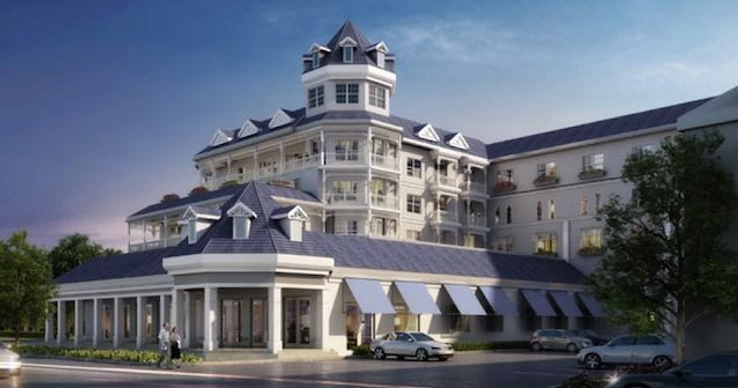
by Anne Mooney | Nov 24, 2020 | Uncategorized, Zoning and Development
Henderson Hotel Stalled
Defect in City-wide Public Notice Delays P&Z Hearing
by Anne Mooney / November 24, 2020
The Winter Park Planning Department announced they have postponed a December 1st Planning & Zoning (P&Z) hearing on the controversial Henderson Hotel at Lake Killarney until after the holidays. The P&Z hearing now will take place Tuesday, January 5. If P&Z approves the project, it will go to the Commission for a first reading and public hearing January 27th and a second reading on February 10th.
The postponement stems from a defect in the Public Notice that was published in the November 1st Orlando Sentinel. Property at 1310 Fairview Ave. was omitted from the Public Notice. Included instead was property at “1310 Grove Ave.,” which does not exist.
The mistake, the result of a City staff error, involves a large parcel at 1310 Fairview that is slated to become a park, a portion of which will also form the roof of the subterranean parking garage that will serve the hotel.
The Henderson Hotel project first came before the City in February 2019, but the application was later withdrawn after a deal to acquire land on 17-92 from Hillstone’s Restaurant fell through.
Hotel Redesigned
This fall, revised plans for the five-story Victorian style hotel were submitted to the City for the three-acre site on Lake Killarney. The new design features a restaurant and bar, ballroom, increased green space, subterranean parking, a reduction in overall building size from 210,522 square feet to 129,100 square feet (not including the garage) and LEED (Leadership in Energy and Environmental Design) certification. The hotel will be set back 84 feet from Lake Killarney and 145 feet from 17-92.
The developer, Winter Park Historic Hotels Group, is requesting changes to the Comprehensive Plan and Zoning Map, vacation of portions of Killarney Drive and Fairview Avenue and a Conditional Use Approval. The hotel has gone from 118 to 132 rooms and ranges in height from 55 to 73 feet. The developer is asking to rezone to C3 Commercial four residential lake-front lots and two parcels zoned office. Although the number of rooms has gone from 118 to 132, the amount of parking went from 245 spaces in 2019 to 235 spaces in 2021.
Winter Park Land Trust not involved in the Henderson project
In return for these concessions, Winter Park Historic Hotels Group plans to offer an easement to just under an acre of land on Fairview Ave. for use as a public park. Some confusion, however, has been created by the Henderson Hotel website www.hendersonhotelwinterpark.com which implies involvement of the Winter Park Land Trust. According to the WPLT that is not the case.
Winter Park Land Trust issued the following statement.
“The Winter Park Land Trust was established to create more park space and green space in our city, and to help ensure that we keep the green space we already have. One method of doing so in this city that is already extensively developed is for the WPLT to accept conservation easements over green space that is to be included as part of redevelopment projects such as those being considered on the Orange Avenue Overlay and adjacent to Lake Killarney.Conservation easements are permanent restrictions preventing the future development of green space. It should be clear, however, that the WPLT does not endorse or support development projects even when the developer may be contemplating the donation of a conservation easement.
We have not endorsed the Henderson Hotel project. Negotiation to include open space within a development is the province of the City. WPLT can help ensure that such green space is permanent, but we will accept an easement only after:
-
- A project has been approved by P&Z and the City Commission
- A developer provides us with specific plans for the proposed green space
- The agreement has been reviewed by the appropriate WPLT committees and legal counsel
- The WPLT Board of Trustees has voted to accept the easement.
None of these steps has been taken for the Henderson Hotel.”
Neighbors divided. On the one hand . . .
David Brenner, a Lake Killarney Dr. resident, said he thought the Henderson seems like it would be a good building for Winter Park. “We were initially concerned about the impact on the lake,” said Brenner. “But when we went to the public forum at the Farmer’s Market a couple of years ago, we were very impressed that [Henderson Hotel developer] Adam Wonus wants to reach out to people who live in Winter Park. We don’t need another Trader Joe’s with the parking and traffic nightmare. If we could get a world class hotel that draws from the history of Winter Park, it would be a great. Adam is listening and trying to make his project work in a way that makes people happy.”
Charles Brenner, who has lived on Killarney Dr. for more than 50 years and is the father of David Brenner, said the health of the lake is the most important thing to him. He looks forward to Wonus’s plans to clean up the eastern side of the lake, which is quite shallow. “A lot of trash comes into the lake from 17-92,” said Brenner, “and that side of the lake has long been neglected. I look forward to it being cleaned up, which Adam and his company plan to do. This is a situation similar to the Alfond, where we have the opportunity for a beautiful project, which will be a great thing for the city.”
On the other hand . . .
In a letter to Commissioner Marty Sullivan, Lake Killarney neighbor Jim Cunningham wrote, “. . .the hotel project is beautiful, and for that reason I wish I could get behind it, but I can’t. . . . I see a correlation between the city’s longing for this project and the German version [of the Cinderella story]. You remember that after Cinderella lost her glass slipper, a search was made throughout the land to find the woman whose foot fit the slipper. When the prince came to Cinderella’s house, the evil stepsisters were willing to cut off their toes to try to make their over-sized feet fit into the slipper, leaving the slipper covered in blood.”
Cunningham continued, “This project is beautiful . . ., but the hotel is not a good fit for the neighborhood. Changing all the city’s ordinances, codes and Comp Plan in an effort to cram this project into a residential neighborhood is reminiscent of the stepsisters’ willingness to do whatever it took to make the slipper fit. . . . The project, as currently conceived, is not a fit for our lakefront community. No amount of ‘cutting off toes’ will change that.”
A group of citizens has put up a website opposing the Henderson project at www.nohendersonhotel.com
To comment or read comments from others, click here →

by Anne Mooney | Nov 12, 2020 | Election
Single Member Districts Fails
Tie Vote on 1st Reading Spells Failure – for now
by Anne Mooney / November 12, 2020
With only four Commissioners present at the November 11 meeting, the ordinance to put Single Member Districts (SMD) to a vote on the March 9, 2021, ballot failed on a 2 – 2 vote. Commissioners Marty Sullivan and Sheila DeCiccio voted in favor. Mayor Steve Leary and Vice Mayor Carolyn Cooper voted against. Commissioner Todd Weaver was absent because of illness.
Ironically, the measure failed twice. First, Cooper moved to deny putting the measure on the ballot. Cooper and Leary voted for; Sullivan and DeCiccio voted against. Immediately following, Sullivan moved to approve putting the measure on the ballot – with the same result.
The Devil is in the Details
Changing the basis of a city’s governance, one that seems to have served the city well for more than 130 years, is complicated – and scary. Just the thought of change can cause anxiety in most people.
That’s not to say change is bad, or that a city can’t change its mode of governance. But it is a difficult and complex task, one that does not happen quickly or easily. Each question seems to give rise to five others. How will districts be drawn? Who will draw them? What data is available to do this in an equitable way? After all, the most recent Census data is now 10 years old. What happens if we annex another neighborhood? What if no candidate files to run in a particular district? In the case of SMD, more than most, the devil is in the details.
Voters Still Want Info about SMD
Despite its defeat last night, email and Facebook traffic indicate that Winter Park voters still want information about what SMD might mean for Winter Park. At a virtual information session conducted by the Coalition for Access and Representation (CFAR) Monday night, Jamie Joyce of the Society Library, a non-partisan non-profit 501(c)(3), presented a white paper that laid out the arguments for and against SMD in Winter Park. The event, including the white paper, can be viewed here. https://www.facebook.com/Coalition-For-Access-and-Representation-CFAR-103882477624971/ What follows is a summary of the arguments Ms. Joyce presented for and against SMD in Winter Park.
Winter Park should have Single Member Districts, because . . .
It promotes civic engagement.
District elections might improve community participation if candidates are more engaged with a particular community. Under-represented constituents will be more likely to participate if they know they are truly represented.
Con: All commissioners should be accountable to all citizens. With SMD, a citizen will technically have only one representative, plus the Mayor, on the commission.
SMD improves racial diversity in representation.
SMD will give Winter Park residents the opportunity to elect a person of color.
Con: In any fairly drawn district in terms of population size, the Winter Park African American population would not achieve a majority. The opportunity to elect a person of color to the Commission is not dependent on SMD, but on the qualifications and appeal of the individual candidate.
SMD improves economic diversity of representation.
Because it is less expensive to campaign in a single district, people at a lower income can afford to run for office.
SMD improves geographic representation.
Single member districts ensure geographic representation.
Con: Geographic representation, in and of itself, still may not ensure representation for under-served ethnic populations like Winter Park African Americans who, because of West Side gentrification, are no longer concentrated in a single small area.
What’s to lose?
If the ordinance is put on the ballot, then it’s up to the voters to decide, freeing the Commissioners from having to make the decision.
Con: Winter Park voters are not educated on this issue; it’s a waste of their time.
Answer to the Con: Then educate them; it’s their civic duty to become informed.
Answer to the answer: Four months is too little time, especially without knowing what the districts would look like.
SMD makes Commissioners more accountable.
Commissioners can be more easily held accountable by localized citizens.
Con: Only the mayor and one Commissioner will be accountable to any given citizen, thereby reducing accountability of the Commission as a whole.
SMD ensures localized issues will receive attention.
Commissioners would be more in touch with issues affecting their constituents.
Con: This will lead to Commissioners putting localized issues ahead of the needs of the whole City.
Builds more effective constituent relationships.
SMD improves overall responsiveness to local issues.
Con: Winter Park Commission already performs well in response to constituent concerns.
Makes elections more free and fair.
Because the cost of a single-district campaign is less, there would be less reliance on contributions from special interests.
Con: Because the cost of a single-district campaign is less, it will be easier for special interests to ‘buy’ an election.
SMD is a more progressive form of government.
Supreme Court Justice Ginsberg cited at large voting, along with racial gerrymandering, as a preeminent second-generation way to deny equal opportunity for minority voters and candidates. A number of local jurisdictions in FL and across the country who traditionally used at large systems have faced federal lawsuits to force a switch to a district-based system as part of the Voting Rights Act.
Con: At just over 7 percent, the minority population of Winter Park is too small for SMD to make any difference.
If we don’t vote on it now, we’ll miss the chance.
If the Commission does not put this ordinance on the ballot now, they are unlikely to consider it again unless some special circumstance arises.
Con: It is still possible to put the ordinance on the ballot through a petition. There is still time to conduct enough information sessions to inform the public.
Winter Park should not have Single Member Districts, because . . .
It’s not the right time.
This is an emotional time for the country, and decisions about government should not be swayed by emotion.
Con: There are good non-emotional reasons to support the ballot initiative.
It won’t achieve the goals it was meant to achieve.
If the goal is to increase the chances of electing an African American commissioner, in any fairly drawn district in terms of population size, the African American population of Winter Park could not achieve a majority, if that’s what it takes to ensure the election of an African American commissioner.
Con: Just because SMD will not ensure the election of an African American commissioner does not mean SMD still is not best for the city and won’t lead to increased diversity in city government.
The electorate doesn’t really want it.
Vice Mayor Cooper noted she had received more than 230 emails from residents about backyard chickens, compared with 26 emails about SMD (five of which came from people who were not Winter Park residents).
Con: Emails to the Vice Mayor is only one indicator. CFAR’s Barbara Chandler has collected more than 100 signatures in support of the motion.
All groups are fairly represented in Winter Park.
Historically, candidates, both successful and failed, have come from fairly distributed parts of the city.
Con: No African American has been elected to the Commission in 133 years.
It’s the wrong cause.
Not enough ethnically and economically diverse candidates are running for office in Winter Park.
Con: It’s likely because of how expensive it is to campaign at large. SMD will make running for office more accessible to residents of various income levels, identities and backgrounds.
SMD is not how cities our size do things.
At-large elections tend to be more practical in small cities and in more homogeneous areas.
Con: Several Central Florida cities in Winter Park’s size range have SMD, including Ocoee, Cocoa, Mt. Dora, Sanford and Winter Garden.
At-large elections are more democratic.
At-large elections allow all residents to vote for all commission candidates.
Con: Democratic institutions have a duty to protect minority groups from disenfranchisement and under-representation by majority rule.
SMD will make the Commission less effective.
SMD may encourage in-fighting, vote-trading and competition among districts for city resources.
Con: The efficacy of the Commission depends upon the quality and character of the individuals who are elected.
SMD will give voters fewer options.
Voters will have a smaller pool of candidates from which to choose.
Con: The options they do have will be more likely to represent their interests.
Asked for her thoughts on the outcome of last night’s Commission vote, CFAR’s Barbara Chandler replied, “. . . this is considered more delaying.”
For more information about SMD, go to http://cfarvote.com/cfar-home-mobile/
To comment or read comments from others, click here →
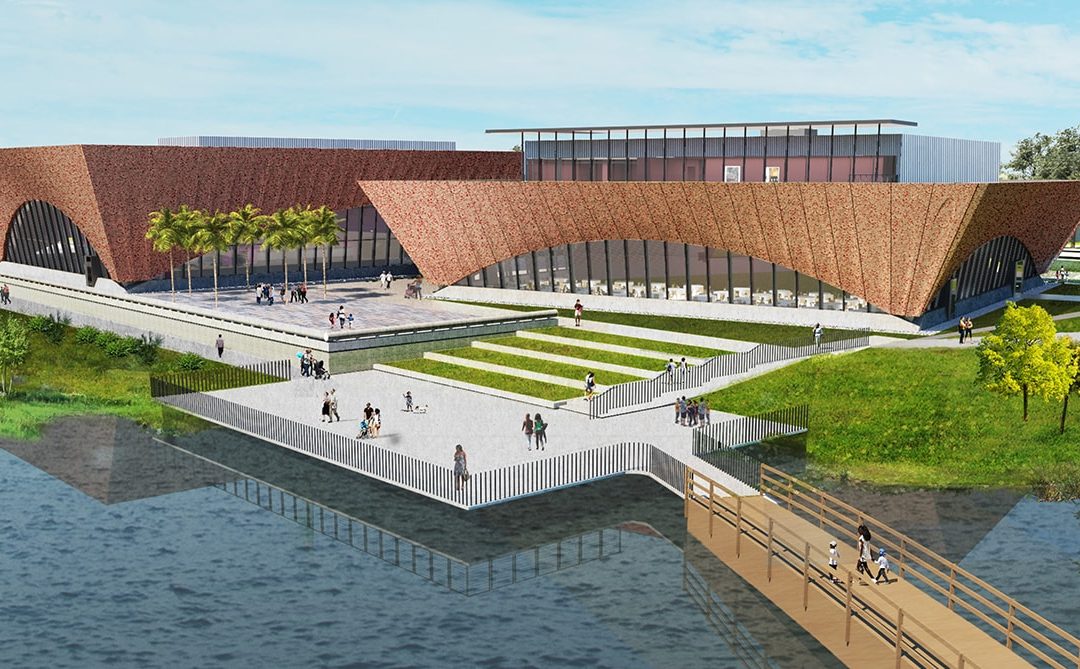
by Anne Mooney | Oct 30, 2020 | Library
Raising the Roof
Library-Events Center Reaches Milestone
by Anne Mooney / October 30, 2020
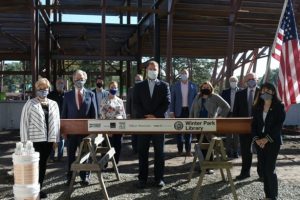 A group of 50 or so dignitaries gathered this morning, October 30, to celebrate the ‘topping out’ of the Winter Park Library & Events Center. This important milestone – the signing and hoisting of the final roofbeam — signifies that the structural skeleton of the building is now complete. Representatives of the Winter Park Public Library, the construction and the architectural firms and major donors joined the Mayor and Commissioners to place their signatures on the beam.
A group of 50 or so dignitaries gathered this morning, October 30, to celebrate the ‘topping out’ of the Winter Park Library & Events Center. This important milestone – the signing and hoisting of the final roofbeam — signifies that the structural skeleton of the building is now complete. Representatives of the Winter Park Public Library, the construction and the architectural firms and major donors joined the Mayor and Commissioners to place their signatures on the beam.
The signing and hoisting of a roofbeam is an ancient practice dating back thousands of years. Some describe origins from pre-medieval Scandinavian cultures, some refer to native American practices, and still others hark back to 2700 BC Egypt. The ceremony marks the completion of the building’s skeleton, and the beam is symbolic of the upper-most piece going into place as the building reaches its full height.
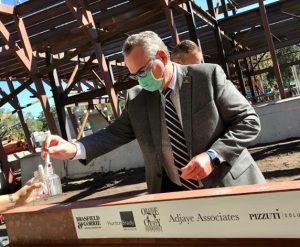
David Odahowski, President & CEO of the Edyth Bush Charitable Foundation, a major donor to the Library-Events Center, affixes his signature to the beam.
Via Skype, design architect Sir David Adjaye said to the assembled crowd, “Today’s topping out ceremony represents a huge milestone in the completion of the Winter Park Library & Events Center. The power of this project is that it represents another prototype, another version of what the library has evolved into – the library as a campus of knowledge. Once completed, the new complex will bring together knowledge and community facilities to make a village, a hamlet of knowledge.”
“The new Library & Events Center in Martin Luther King, Jr. Park, will not only activate reading, imagination and creativity,” said Winter Park Public Library Board of Trustees President Lawrence Lyman, “it will be transformative for our community. . . . I couldn’t be more thrilled that the library’s vision has been brought to life by such a masterful architect.”
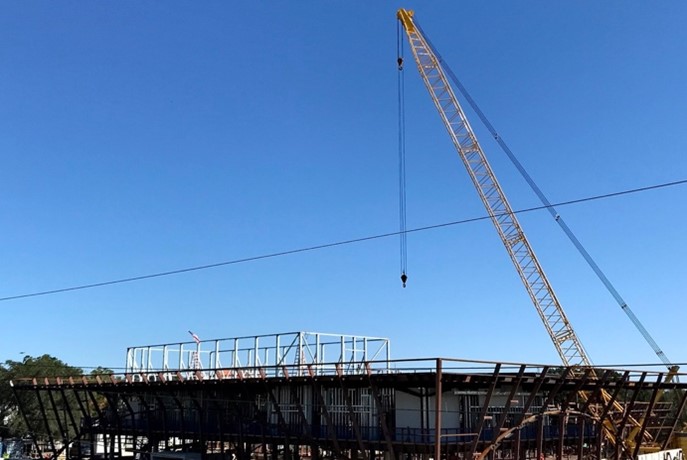
The grand opening of the Winter Park Library & Events Center is expected in the Fall of 2021.
To comment or read comments from others, click here →
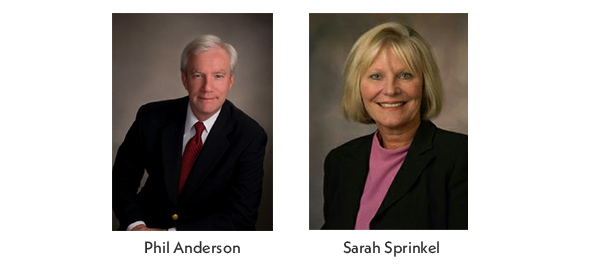
by Anne Mooney | Oct 25, 2020 | Custom Author, Election
Anderson, Sprinkel Run for Mayor
by Anne Mooney / October 25, 2020
Former Commissioners Phil Anderson and Sarah Sprinkel will vie for the Mayor’s seat being vacated in March 2021 by Steve Leary. Even though the filing deadline is not until January 19, 2021 — which means there could be additional contenders — Anderson and Sprinkel have established campaign organizations and will begin active campaigning following the November 2020 election. The Winter Park general election is March 9, 2021. A runoff, if necessary, will be held April 13, 2021.
Platform Statements
On her platform, Sprinkel promises not to raise your taxes, to provide leadership during the pandemic and to exercise fiscal responsibility. In his platform, Anderson promises to protect the charm and character of Winter Park, to put residents’ interests first at City Hall and to make decisions that will keep Winter Park financially strong and prepared for the future.
You can find out more here https://www.electsarahsprinkel.com
And here https://www.philforwp.com
Campaigning in a Pandemic
This pandemic-era election cycle will look very different from previous campaigns. Sprinkel said, “I never want to put someone else at risk. I worry about my husband as much as I worry about myself. I don’t think I’ll be out and about very much – I don’t think we’re quite ready for that. So, this will be a different kind of campaign.”
Anderson was of like mind. “We are holding virtual campaign meetings and small-group outdoor meetings,” he said. His campaign is holding ‘meet & greets’ either outdoors with social distancing or via Zoom. He said they are also relying heavily on social media.
Anderson talked about the difference between this campaign and the campaign when he won the Commission seat he held from 2008 to 2011. “What I enjoyed about the 2008 cycle was the door to door thing, meeting people, hearing their stories,” he said. “But we can’t do that this time. I’m still going to do the Farmer’s Market – but not until after the general election.”
Who is Sarah Sprinkel?
Sprinkel served three terms as Commissioner from 2011 to 2020, when she stepped down in order to run for Mayor in 2021. If she is elected, Sprinkel will be the first woman to serve Winter Park as Mayor. Asked if she thought her gender would influence her leadership style, Sprinkel replied, “Yes, women look at things differently than men. My whole life has been spent lifting up families. I think we could do with some nurturing in leadership, under the circumstances. We should be working on a safety net for families right now. You have to have that open heart and that open mind.”
Sarah Sprinkel is a teacher. According to her website, she taught kindergarten for 10 years, then moved into administration to develop early childhood programs. She retired from the Orange County Public School System after 33 years and went to the Central Florida YMCA to partner with Disney to create two child development centers for cast members’ children. After retiring from Disney, she went to Florida Virtual School to create an Elementary program for FLVS. She now teaches classes as an adjunct at UCF and works with interns there.
Who is Phil Anderson?
Phil Anderson is a business executive with 35 years’ experience in finance and operations. He earned a degree in civil engineering from Georgia Tech and began his career building power plants for Georgia Power Company — valuable experience when it comes to understanding the complexities of the City of Winter Park utilities.
Over the past 35 years, Anderson has helped create several businesses that have invested over $10 billion dollars in more than 300 communities across the country. Most recently, he co-founded Bridge Seniors Housing Fund Manager in Orlando where he serves as Chief Investment Officer. Prior to that he served as Chief Operating Officer of CNL Retirement Properties.
Anderson and his wife Jennifer are patrons of local organizations such as the Boys & Girls Club of Eatonville, the Albin Polasek Museum and Gardens, and the Winter Park History Museum. Anderson is the founding treasurer of the Winter Park Land Trust and a member of the board of directors of Legacy Pointe at UCF — a non-profit retirement community.
How do they feel about the Orange Avenue Overlay?
Asked about her feelings on the OAO, Sprinkel said, “I have no problem with it. Remember, it didn’t begin with this project. They’ve been looking at this since form-based codes in 2003. It’s past time for the city to solve the problems that are in that area, especially road safety. People working together can solve things. That is the most dangerous road in Winter Park. Safety is paramount. For me, it’s never been about anything but safety. I do hope it eventually comes to fruition.”
To the same question, Anderson responded, “This is a great illustration of differences between me and Sarah. The OAO is very good as a concept. I do not agree, however, that it was ready for a vote when it got pushed through at the last minute. I’m glad the present commission is demanding illustrations of what the increased density would look like before they grant three to four times the increased maximum allowable building size.”
Anderson continued, “I believe we didn’t follow the norms of how we grant substantial increased densities to various landowners. When Rollins moved forward with the Innovation Triangle, we got a flier in our mailboxes with a diagram of the new buildings and a statistical table of their “ask.” The table showed what they were entitled to and what variances they were seeking. Why did that not happen in the largest rezoning in Winter Park history? The situation is now being corrected by the new commission. That’s the substance of the work sessions – illustrations of what these plans might allow. We badly need that to encourage an informed debate about the future of our city’s skyline.”
To comment or read comments from others, click here →
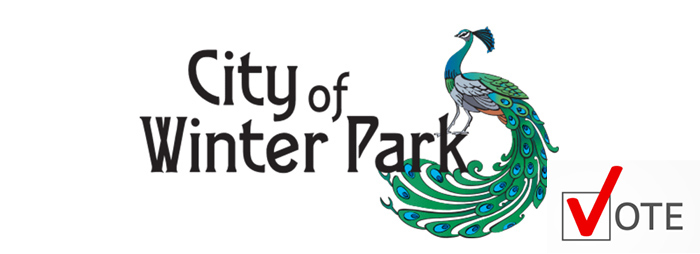
by Anne Mooney | Sep 25, 2020 | Custom Author, Headline, Taxes
FY2021 Budget Passes
Millage Rate Unchanged for Year #13
by Anne Mooney / September 25, 2020
On September 23, Commissioners passed the FY2021 Budget, holding the millage rate steady at 4.0923 for the 13th consecutive year. Ordinances establishing the millage rate and adopting the Budget passed on a 4-1 vote, with Mayor Steve Leary dissenting.
Orange County sets property valuations
Property taxes will rise slightly, since property values were assessed by Orange County in January 2020 prior to the beginning of the pandemic. This reporter’s annual property taxes rose by less than $50, so with the steady millage rate, the increase for most property owners will be minimal.
According to Peter Moore, Winter Park’s Division Director of the Office of Management and Budget, residential real estate taxes comprise about 79 percent of the City’s tax base, leaving the City on solid fiscal footing for now. The City boasts unencumbered General Fund reserves of approximately $17 million.
Postponed SunRail payments used to create contingency fund
The City also has created an approximately $500,000 contingency fund. This money was originally budgeted to pay for SunRail, but the state of Florida has postponed SunRail payments for another two years, allowing the money to be reallocated. “These funds are available now for emergency relief,” wrote Peter Moore, “as we manage the economic repercussions of the pandemic.”
Cautiously optimistic outlook for the future
Moore cautioned that while property tax revenues will be unaffected in the present, as values were established before the pandemic, possible future deterioration in the real estate market could affect Winter Park, and business closings and vacant storefronts will have a definite negative impact. “With almost $2 million in assistance either pledged or spent already by the city to assist its businesses and residents,” wrote Moore, “the city continues to work with all our stakeholders to navigate this difficult time.”
To comment or read comments from others, click here →









Recent Comments